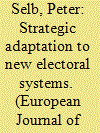| Srl | Item |
| 1 |
ID:
089890


|
|
|
|
|
| Publication |
2009.
|
| Summary/Abstract |
Compulsory voting (CV) undoubtedly raises electoral turnout. Yet does it also affect individual party choices and aggregate election outcomes? Previous studies have focused on partisan or 'directional' effects of CV in favour of, for example, social-democratic or anti-establishment parties. These effects are usually small, however. Using survey data from the Belgian General Elections Study, this article finds that CV primarily affects the consistency, rather than the direction, of party choices. In particular, the analyses suggest that CV compels a substantial share of uninterested and less knowledgeable voters to the polls. These voters, in turn, cast votes that are clearly less consistent with their own political preferences than those of the more informed and motivated voluntary voters. Claims that CV promotes equal representation of political interests are therefore questionable.
|
|
|
|
|
|
|
|
|
|
|
|
|
|
|
|
| 2 |
ID:
113305


|
|
|
|
|
| Publication |
2012.
|
| Summary/Abstract |
How quickly, to what extent and under what conditions do voters and elites adapt to new electoral institutions in order to not waste their votes and effort on hopeless competitors? A latent-curve model of strategic adaptation is developed and fitted to district-level election data from Spain. The extent of strategic adaptation is generally found to vary with the strength of the electoral system. However, grave ethnic tensions are demonstrated to seriously retard adaptation even under favourable institutional conditions.
|
|
|
|
|
|
|
|
|
|
|
|
|
|
|
|